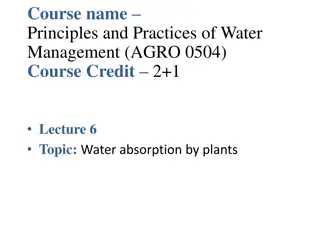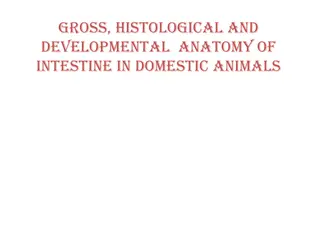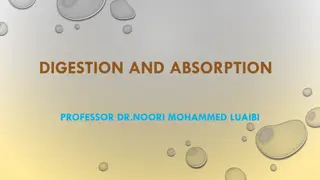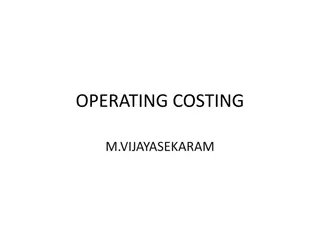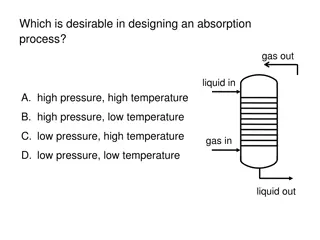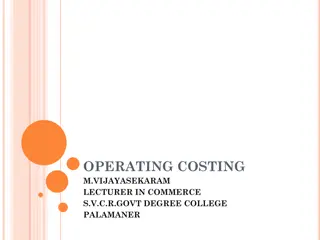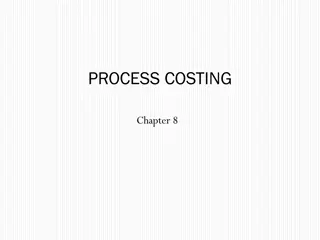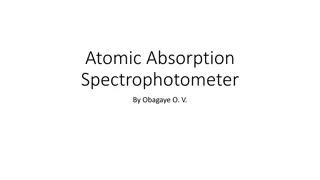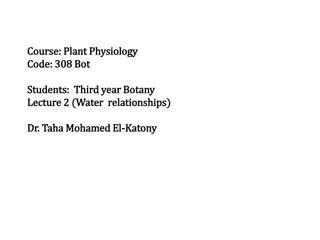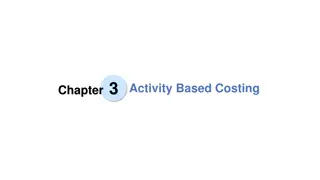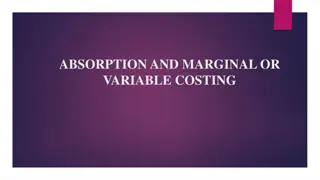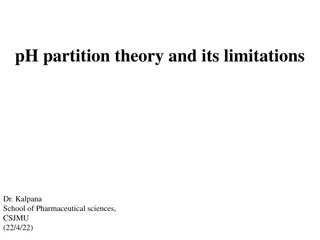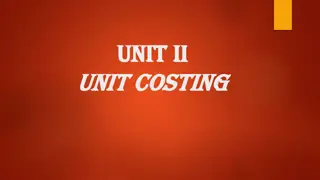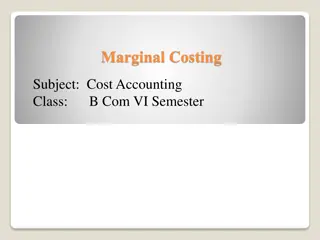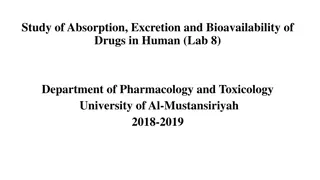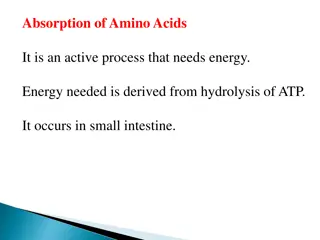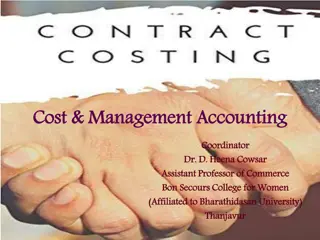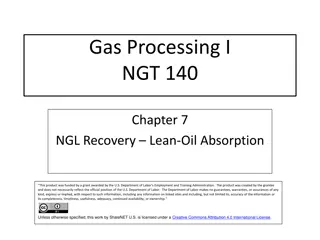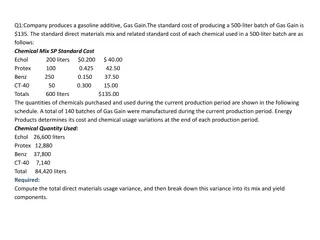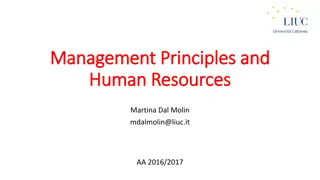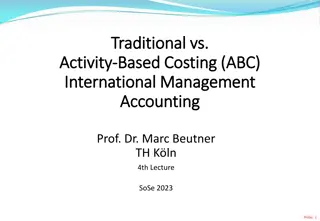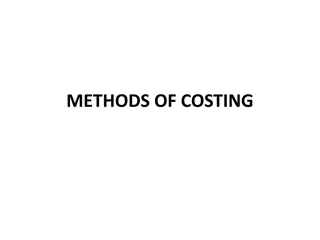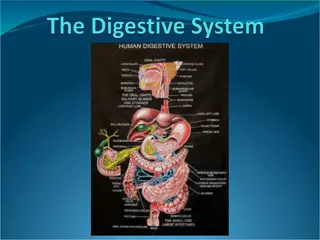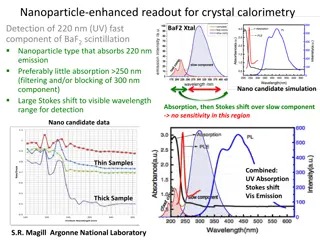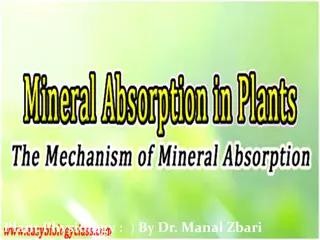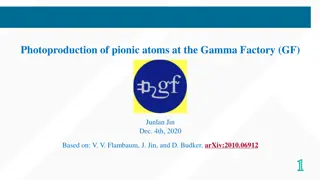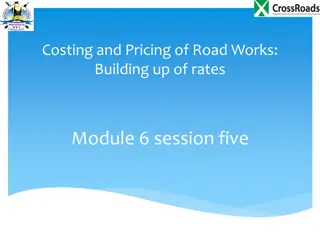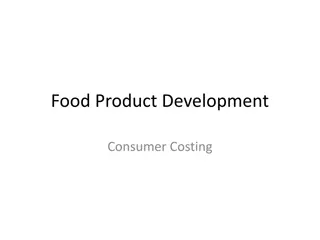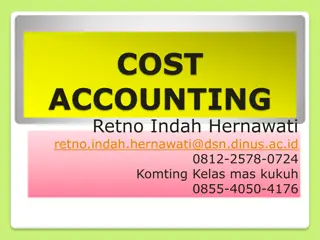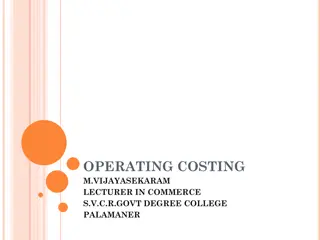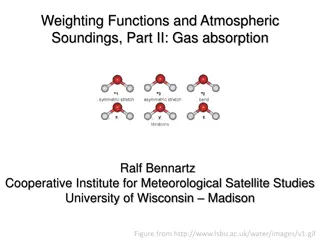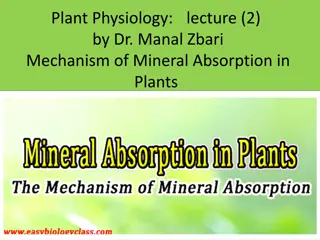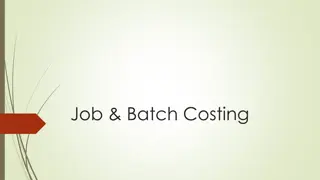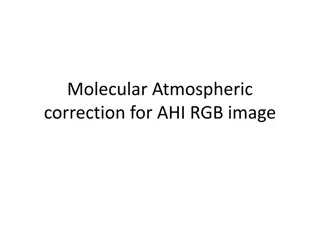Management Acounting & Control
Functions, scope, and limitations of management accounting, as well as cost accounting, break-even analysis, marginal costing, activity-based costing, budgeting, standard costing, responsibility centers, and current issues in management accounting.
21 views • 22 slides
ASPEN Staged Separation Unit-Ops
Introduction to Aspen Staged Separation Unit Operations for the purification of desired components by removing impurities and pollutants using distillation, absorption, and stripping columns. This technology is relevant to ammonia synthesis to prevent catalyst poisoning by removing CO2 through absor
0 views • 26 slides
Understanding Product Life Cycle Costing: A Comprehensive Analysis
Lifecycle costing involves tracking cost records of assets throughout their entire lives, optimizing asset usage at minimal cost. Product lifecycle costing accumulates a product's costs from inception to disposal, with stages like Introduction, Growth, Maturity, and Decline. It helps assess profitab
4 views • 19 slides
Understanding Water Absorption in Plants: Mechanisms and Implications
Exploring the intricate process of water absorption in plants, this course delves into the active and passive methods used by roots to uptake water from soil, the role of osmosis in osmotic active absorption, the influence of transpiration on passive absorption, and the significance of root hairs in
1 views • 26 slides
Anatomy of Intestine in Domestic Animals
The intestine in domestic animals plays a vital role in digestion and absorption. It consists of the small intestine for chemical digestion and absorption and the large intestine for water absorption and excretion. This article covers the gross anatomy, histology, and embryology of the intestine, de
2 views • 84 slides
Understanding Digestion and Absorption in the Gastrointestinal Tract
Digestion and absorption in the gastrointestinal tract are crucial processes for breaking down carbohydrates, fats, and proteins into smaller compounds that can be absorbed by the body. Carbohydrates undergo hydrolysis to convert into monosaccharides, fats are broken down from triglycerides, and pro
1 views • 22 slides
Understanding Operating Costing in Service Industries
Operating costing is a method utilized by service-oriented businesses to ascertain the costs of providing services. Industries such as transportation services, welfare services, utility suppliers, and municipal services find operating costing beneficial. The method involves classifying costs into th
0 views • 6 slides
Understanding Absorption Processes and McCabe-Thiele Analysis
Desirable conditions in designing an absorption process include low pressure and high temperature for the gas in and liquid out. Learn about appropriate plots, points on the operating line, absorption factors, minimum absorbent usage, assumptions in McCabe-Thiele analysis, and differences between co
3 views • 14 slides
Understanding Operating Costing in Business
Operating costing involves ascertaining costs for providing standardized services, aiding in efficiency, cost control, pricing decisions, and equipment maintenance. The objectives, unit of cost, and cost classifications are crucial components of this costing method.
1 views • 5 slides
Understanding Process Costing in Manufacturing Industries
Process costing is a widely used method in mass production industries like steel and chemicals. It involves accumulating costs process-wise for standardized products resulting from sequential operations. Essential characteristics include continuous production, standardized products, and handling nor
1 views • 18 slides
Understanding Absorption Costing and Overhead Absorption in Cost Accounting
Absorption costing is a method that includes direct costs and a fair share of production overhead costs in the cost of a product. Overhead absorption rate (OAR) is calculated using budgeted figures and can lead to over/under-absorption. Over-absorption occurs when absorbed overhead is more than actu
1 views • 23 slides
Understanding Atomic Absorption Spectrophotometry in Analytical Chemistry
Atomic absorption spectrophotometry (AAS) is a spectro-analytical technique used for quantitative determination of chemical elements through the absorption of light by free atoms. This method is vital in various fields like biophysics, toxicology, and archaeology, allowing the analysis of over 70 di
0 views • 9 slides
Enhancing CO2 Absorption Through Prioritizing Agriculture in UNFCCC Deliberation
COP 24 aims to address the challenges of global warming but faces obstacles in reducing CO2/GHG emissions. Emphasizing agriculture as a key solution due to its CO2 absorption capabilities can lead to breakthroughs. Implementing measures like modern technology in agriculture and promoting initiatives
1 views • 12 slides
Understanding Water Absorption in Plant Root Systems
Absorption of water by plant roots is a crucial process involving osmosis and gradients. The root system structure plays a vital role in water absorption efficiency, with root hairs being key to this process. Factors such as soil penetration depth and root hair characteristics impact the extent of w
0 views • 21 slides
Understanding Activity-Based Costing (ABC) in Cost Management
Activity-Based Costing (ABC) is a strategic costing method that allocates overhead costs to products based on activities. It offers benefits such as accurate cost allocation and identifying cost drivers but also has challenges due to increased complexity and customization. ABC differs from tradition
1 views • 15 slides
Understanding Absorption and Marginal Costing in Accounting
Absorption costing, also known as full costing, encompasses all costs including fixed and variable related to production. It aids in determining income by considering direct costs and fixed factory overheads. Meanwhile, marginal costing focuses on only variable manufacturing costs and treats fixed f
0 views • 14 slides
Understanding Biopharmaceutics: pH Partition Theory and Drug Absorption
Biopharmaceutics explores how drug properties and administration methods impact drug absorption. Factors affecting oral absorption include membrane physiology and drug partitioning based on pH levels. The pH partition theory, explained by Brodie et al., highlights the role of drug lipid solubility a
0 views • 9 slides
Understanding Unit Costing in Industries
Unit costing is a method based on production units and is used in industries with continuous and uniform production of a single product or similar grades. The cost per unit is calculated by dividing the total cost incurred by the number of units produced. Various industries like collieries, quarries
2 views • 18 slides
Understanding Marginal Costing in Cost Accounting
Marginal Costing is a cost analysis technique that helps management control costs and make informed decisions. It involves dividing total costs into fixed and variable components, with fixed costs remaining constant and variable costs changing per unit of output. In Marginal Costing, only variable c
1 views • 7 slides
Understanding Drug Absorption, Excretion, and Bioavailability in Humans
Delve into the complex processes of drug absorption, excretion, and bioavailability in the human body. Learn about the various factors affecting drug absorption from the gastrointestinal tract, including biological, physiochemical, and pharmaceutical factors. Explore the mechanisms of drug transport
0 views • 24 slides
Amino Acid Absorption Mechanisms in Small Intestine
Amino acid absorption in the small intestine is an active process requiring energy derived from ATP hydrolysis. It involves two main mechanisms: carrier proteins transport system and glutathione transport system. The carrier proteins transport system uses ATP energy for absorption, while glutathione
0 views • 18 slides
Modern Developments and Approaches in Business Environment
This covers topics such as modern manufacturing, costing techniques, continuous quality management, optimizing throughput, externally-focused management approaches, forecasting techniques, pricing decisions, project management, and more. Specific discussions include differences between cost accounti
0 views • 11 slides
Understanding Contract Costing in Management Accounting
Contract costing in management accounting refers to a specific type of job costing applied to long-term projects like construction. Contracts serve as cost centers executed under customer specifications, involving materials, wages, direct charges, sub-contracts, and completion certificates. Contract
0 views • 14 slides
Lean Oil Absorption Process in Gas Processing
The Lean Oil Absorption process in gas processing involves using hydrocarbon-rich lean oil to absorb heavier hydrocarbons from natural gas, allowing for increased gas condensate recovery. This method is a cost-effective way to separate different products in natural gas, alongside refrigeration proce
1 views • 14 slides
Costing and Variance Analysis in Manufacturing Processes
The content discusses various scenarios related to costing and variance analysis in manufacturing processes. It addresses topics such as direct materials usage variance, direct labor mix and yield variances, total direct labor efficiency variance, and standard costing system variances. The examples
0 views • 8 slides
Costing Techniques in Management Principles by Martina Dal Molin
Explore the different costing techniques such as Job Order Costing, Process Costing, and Operation Costing, as outlined by Martina Dal Molin for the Management Principles course. The Job Order Costing method focuses on allocating costs based on individual jobs or batches of products, emphasizing dir
3 views • 20 slides
Activity-Based Costing (ABC) in International Management: Methods and Analysis
Explore the application of Activity-Based Costing (ABC) in International Management, focusing on methods of assigning overheads, cost drivers, product and period costs, and value chain analysis. Dive into topics such as budgetary control systems, standard costing, flexible budgets, variance analysis
0 views • 48 slides
Introduction to Different Methods of Costing
Costing is a crucial technique for businesses to ascertain their costs, regardless of being in manufacturing, merchandizing, or service provision. This article explores various methods of costing such as job order costing, batch costing, contract costing, process costing, and service costing. Job or
0 views • 53 slides
Understanding the Human Digestive System: A Comprehensive Overview
The digestive system plays a vital role in breaking down food into nutrients for absorption. This process involves stages like ingestion, digestion, absorption, and egestion. Beginning with the mouth, food moves through the esophagus, stomach, and small intestine for digestion and absorption of nutr
0 views • 21 slides
Nanoparticle-Enhanced Readout for Crystal Calorimetry: BaF2 Scintillation Detection
Nanoparticles with specific absorption and emission properties are explored to enhance the readout process for BaF2 crystal calorimetry, focusing on detecting the fast 220nm UV component. The goal is to achieve a large Stokes shift to the visible wavelength range for efficient detection, while minim
0 views • 7 slides
Mineral Absorption in Plants: Mechanisms and Types
Plants absorb minerals from the soil as ions through the roots, with the process of mineral absorption being distinct from water absorption. Mineral absorption in plants can occur through passive or active methods, each involving different mechanisms and energy requirements. Passive absorption is a
0 views • 14 slides
Photoproduction of Pionic Atoms at the Gamma Factory: Research Overview
Research conducted by V. V. Flambaum, J. Jin, and D. Budker at the Gamma Factory (GF) on photoproduction of pionic atoms is detailed in this content. It explores the formation of pionic atoms with negative pions orbiting the nucleus in a hydrogen-like system, emphasizing strong interaction effects a
0 views • 11 slides
Understanding Costing and Pricing of Road Works
Exploring the process of costing and pricing road works, including factors to consider, building up rates, and the importance of accurate cost estimation. Contractors cost road works to estimate resources, set competitive prices, and ensure profitability. Various approaches to costing works and key
0 views • 24 slides
Understanding Food Product Development and Costing
Explore the intricacies of cost management in food product development, including factors affecting costing, ways to reduce cost prices, and the impact on profit margins. Learn about key components of costing such as raw materials, testing, packaging, transportation, and marketing. Discover the diff
0 views • 12 slides
Understanding Cost Accounting Principles and Concepts
Explore the fundamentals of cost accounting through the 14th edition by Carter. Learn about cost concepts, production costing, job order costing, process costing, activity-based accounting, joint costing, and standard costing. Dive into assessments, activities, and classifications of costs related t
0 views • 28 slides
Understanding Operating Costing in Service Industry
Operating costing, also known as service costing, is a method of determining costs for standardized services provided by organizations. It focuses on service provision rather than manufacturing goods. Key features include uniform service delivery, classification of costs into fixed and variable, and
0 views • 6 slides
Gas Absorption and Atmospheric Soundings: Principles and Applications
Gases in the atmosphere absorb radiation through various mechanisms such as changing rotational/vibrational energy and exciting electrons. This absorption plays a crucial role in remote sensing applications. The absorption principles differ for molecules like CO2 and H2O, influencing their vibration
0 views • 9 slides
Mechanism of Mineral Absorption in Plants: Active vs Passive Methods
Plants absorb minerals from the soil in the form of inorganic ions through both passive and active methods. Active mineral absorption requires metabolic energy, whereas passive absorption occurs along the concentration gradient by simple diffusion. The roots play a vital role in mineral absorption d
0 views • 14 slides
Understanding Job and Batch Costing in Industries
Job and Batch Costing are methods used in industries to ascertain the cost of specific jobs or batches separately. Job Costing is ideal for dissimilar or non-repetitive industries, while Batch Costing treats each batch as a cost unit. Both methods help in cost analysis, profitability assessment, and
0 views • 7 slides
Atmospheric Correction Techniques for Satellite Image Enhancement
Atmospheric correction is essential for improving the quality of Remote Sensing images captured by satellites. This process involves correcting for the effects of atmospheric gases such as scattering and absorption on the measured Top-of-Atmosphere (TOA) reflectance. Techniques like molecular correc
0 views • 8 slides



